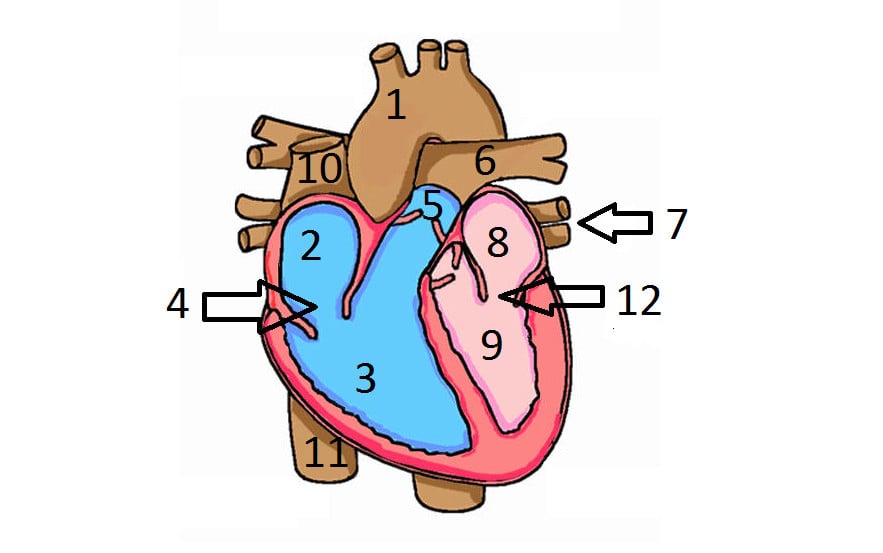Career that entails diagnosing, treating, and managing patients with cardiovascular diseases
What is a Cardiologist
The structure that prevent food from entering the larynx and trachea.
What is the Epiglottis?
Structure that destroys harmful organisms that enter the body through the mouth.
What are tonsils?
What is a heart attack?
Number 9 on the diagram.
What is the Left Ventricle?
Vessels in the circulatory system where gas exchange takes place.
What are Capillaries or Alveoli
What is a Pulmonologist?
Professional that specializes in the diagnosis and treatment of microbial diseases.
Which circulatory disease is characterized by a deficiency in the production of normal hemoglobin?
What is Anemia?
Number 10 on the diagram.

What are Bronchioles?
The three layers of the heart in order from deep to superficial.
What is Endocardium, Myocardium, Pericardium?
The bronchus that inhaled objects are more likely to get lodged in because it is more vertical, wider, and shorter
What is the Right Bronchus?
The responsibility of Lymph Nodes
What is Trapping Foreign Particles?
Respiratory disease described as lung inflammation.
What is Pneumonia?
Number 7 on the diagram.

What are Pulmonary Veins?
The origin of the lub-dub sounds of the heart.
What are Valves opening and closing?
Respiratory disease caused by spasms of the smooth muscle in the walls of the bronchi and bronchioles.
What is Asthma?
The ways that mononucleosis can be spread.
What is kissing, sharing drinks, sharing utensils?
Respiratory condition caused by bacterium and is highly communicable.
What is Tuberculosis?
Number 3 on the diagram.

What is the Larynx.
Blood flow through the heart.
What is
1. Superior/Inferior Vena Cava
2. Right Atrium
3.Tricuspid Valve
4. Right Ventricle
5. Pulmonary Semilunar Valve
6. Left and Right Pulmonary Arteries
7. Lungs
8. Left and Right Pulmonary Veins
9. Left Atrium
10. Bicuspid Valve
11. Left Ventricle
12. Aortic Semilunar Valve
13. Aorta
14. Body
Air flow through the lungs
What is...
1. Mouth/nose
2. Nasopharynx
3. Oropharynx
4. Laryngopharynx
5. Epiglottis
6. Larynx
7. Trachea
8. Bronchi
9. Bronchioles
10. Alveoli
11. Alveoli-capillary Membrane
12. Internal Respiration (gas exchange)
The type of cells that HIV attacks.
What are T Cells?
What happens to AIDS patients because they have a compromised immune that actually ends up causing death.
What are Opportunistic Infections?
Number 5 on the diagram.

What is the Pulmonary Semilunar Valve?